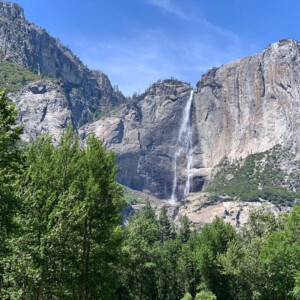
Psalm 134 is the fifteenth and last psalm of the "Songs of Ascents" or what is also called the “Pilgrim Psalms”. The psalm closes the collection with a benediction and leads into a series of psalms that emphasize praising the Lord. It is interesting to note that when the pilgrim began his journey to Jerusalem, the first prayer of this section of psalms, Psalm 120, indicates that he was at a low point spiritually. “In my distress I cried to the LORD… Woe is me….” (vv. 1, 5). But now, in Psalm 130, having completed his time of worship and cleansing at the place of worship in Jerusalem, he loudly proclaims, “Bless the LORD”! A wonderful change has taken place in his life! We notice several great encouragements from this psalm.
First, we have a God Who never sleeps (v. 1). As you review these fifteen psalms, you see that the pilgrims had a variety of experiences on their journey, but they arrived safely in the Holy City, fulfilled their obligations, and were now preparing to return home. It was night and they wanted to make one last visit to the temple. Directed by the high priest, the temple priests and Levites were responsible to make sure everything was in order for the next day's ministry. The pilgrims heard a temple choir singing the praises of Jehovah, and their ministry would continue all night. Pagan temples were silent at night, because their gods had to rest (1 Kings 18:27), but "He who keeps you will not slumber. Behold, He who keeps Israel shall neither slumber nor sleep" (Psalm 121:3-4). The Lord gives sleep to His beloved people, but He stays awake and guards the city and watches over the family (Ps. 127:1-2). He also hears the praises of His people.
"The LORD that made heaven and earth" (v. 3), also made the day and the night (Gen. 1:14-19), and “the darkness and the light are both alike to Him” (Ps. 139:11-12). When we go to sleep, we know that the Father is caring for us, and when we awaken, He is there to greet us (Ps. 91:1-6). If we awaken in the night, we can fellowship with Him and meditate on His Word (Ps. 119:55, 62, 147-148). If God never slumbers nor sleeps, why should we stay awake all night, tossing and turning and fretting? "Be still, and know that I am God" (Ps. 46:10).
Next, we have worship that never ends (v. 2). David arranged that the temple choirs praise the Lord day and night (Ps. 92:1-2; 1 Chron. 9:33; 23:30). While you and I are asleep in our part of the world, somewhere else on the globe, believers are worshiping God. Even more, Jesus Christ, our High Priest in heaven never ceases to intercede for us and enables us to pray and to worship. God gives us "songs in the night" (Ps. 42:8; 77:6; Job 35:10; Isa. 30:29), when circumstances are difficult and we cannot see our way.
The greatest responsibility and highest privilege of individual believers and of churches is to worship God, for everything that we are and do flows out of worship. As the choir in the temple lifted their hands to heaven (see on 28:2), they were pointing to the Source of all good things and praising Him for His mercy and grace. True worshipers lift "clean hands and a pure heart" to the Lord (Ps. 24:4; James 4:8), for the Lord looks on the heart. We will worship God for all eternity (Rev. 4-5), so we had better start learning now.
Finally we should realize we are blessed to be a blessing to others (v. 3). As the pilgrims left the temple, a priest on duty called, "May the Lord bless you from Zion". The pronoun "you" is singular, for the blessing of God is for each of us personally. To leave God's house with God's blessing upon us is a great privilege, but it is also a great responsibility, for we must share that blessing with others. If it is a joy to receive a blessing, it is an even greater joy to be a blessing. If the LORD who made the heaven and the earth never sleeps, and our worship never ends, then the blessing will not stop.
God bless!
More Episodes
 2024-01-24
2024-01-24
 2024-01-20
2024-01-20
 2024-01-19
2024-01-19
 2024-01-18
2024-01-18
 2024-01-17
2024-01-17
 2024-01-16
2024-01-16
 2024-01-15
2024-01-15
 2024-01-14
2024-01-14
 2024-01-13
2024-01-13
 2024-01-12
2024-01-12
 2024-01-10
2024-01-10
 2024-01-09
2024-01-09
 2024-01-08
2024-01-08
 2024-01-07
2024-01-07
 2024-01-05
2024-01-05
Create your
podcast in
minutes
- Full-featured podcast site
- Unlimited storage and bandwidth
- Comprehensive podcast stats
- Distribute to Apple Podcasts, Spotify, and more
- Make money with your podcast
It is Free
- Privacy Policy
- Cookie Policy
- Terms of Use
- Consent Preferences
- Copyright © 2015-2024 Podbean.com






